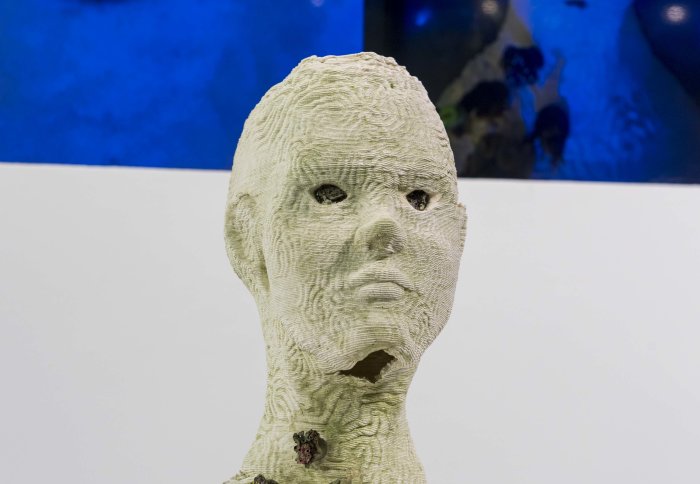Winning entries of first Grantham Art Prize stir emotions at exhibition opening
by Simon Levey

"Art shows what data cannot" at first exhibition of climate change art in Imperial College Main Entrance.
In celebration of Earth Day 2019, the Grantham Institute - Climate Change and the Environment and the Royal College of Art teamed up to present the Grantham Art Prize – a dynamic exhibition showcasing the six winning artworks of a competitive open call launched last year.
Contemporary art students from across the UK were invited to collaborate with Imperial's leading climate and environmental researchers to propose new, interdisciplinary artworks that spark meaningful contemplation and conversation about climate change, one of the most pressing issues of our time.
At the exhibition's official opening, members of the arts and sciences community came together to view the winning entries and discuss how both art and science can inform often difficult conversations about climate change.
Attendees also heard a panel discussion entitled 'Climate Exchange: Is art essential to driving climate action?' on the challenge humanity is facing, the changes we need to make within society, and how and why artists should help tackle this challenge.
This free exhibition is open to the public at Imperial's College Main Entrance at South Kensington 10:00-18:00 until Sunday 28 April, and again during the Great Exhibition Road Festival from 11:00-17:00 on 29-30 June, as part of the Greener Futures Zone at Imperial’s South Kensington Campus.
“Get emotionally involved”: Images from the exhibition

"Art shows what data cannot," said Peter Kennard, contemporary artist and Professor of Political Art at the Royal College of Art, who spoke at the panel discussion. "The role of the artist is to make this information available in a way that will help people to think about it. It about not just seeing what's on the surface but helping people get emotionally involved in it."

Professor Martin Siegert, co-director of the Grantham Institute, a member of the judging panel for the Grantham Art Prize 2019 said: "Art is clearly a vital part of human culture, and through the Grantham Art Prize we hope to inspire plenty of conversation about what art and artists can bring to the challenge of climate change. This inaugural exhibition is both revealing and beautiful. We were blown away by the representations and expressions of the environmental challenges we face, and their potential solutions."

Alison Tickell, Founder of Julie’s Bicycle, a charity that supports the creative community to act on climate change and environmental sustainability, who chaired the panel discussion, said: "Climate and culture speak to one another all the time – it’s a seamless conversation but we aren’t hearing it. This is what the Grantham Art prize is all about. Crossing divides, expressing meaning in new ways and celebrating the deep symbiosis between the arts and science put to purpose."

"The work of a climate scientist cannot purely be in your studies, like focusing on one tree and not seeing the forest," said Dr Arnaud Czaja, Reader in Physical Oceanography at Imperial, who took part in the discussion. "Being part of events where people from different backgrounds mix and express their perspective is like a kick in the guts. Interacting with different views makes the world much richer, exploding you out of your silo, and showing that you are part of something much bigger."

"We need to speed up action on climate change, and one way to help do just that is for us to all talk about it more," said Dr Alice Bell, Co-Director of the campaign group 10:10 Climate Action. "Climate change is a very difficult subject to talk about, it's not obvious to the naked eye, which is why we need science to tell us it's happening, but it can also make us feel grief or guilt, and there are various cultural issues that make us want to avoid thinking or talking about it."

Peter Kennard also praised up-and-coming artists who are thinking about their own environmental impact: "Artists now are not just thinking of the image, but the carbon footprint of the art. Glitzy stuff from the 90's would look very wrong now because it uses so much of the Earth's materials. Artists now are using simpler means, perhaps using ideas from the scientists who are researching it, in reducing the amount of material they use, and there is so much creativity out there."

Meet the winners
The Grantham Art Prize 2019 winning entries were:
Planet Greenhouse, by Fernanda Dobal and Alison O'Reilly with support from Professor Joanna Haigh
Pine Island Glacier. Anthotype, 2019, by Melanie King with support from Professor Tine van de Flierdt
The Labyrinth, by Qiaoer Jin and Zhengyi Zhang
The Outside Inside, by Johanna Schmeer
We Are You, by Miyuki Oka and Barna Soma Biro
Yoshino Cherry Tree, by Michiko Yamamoto, Dr Kris Murray and Sonia Tiedt
To keep up-to-date with research activities, events, publications and training opportunities at the Grantham Institute, sign up to the Grantham Institute Weekly Update.
Article supporters
Article text (excluding photos or graphics) © Imperial College London.
Photos and graphics subject to third party copyright used with permission or © Imperial College London.
Reporter
Simon Levey
Communications Division